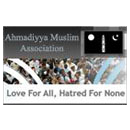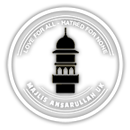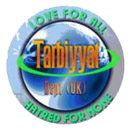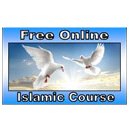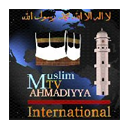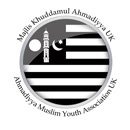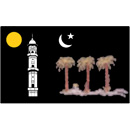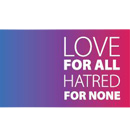Account of Ismail Wyeth
I felt I wanted to find something greater in life,
something I could use to guide me through life.
My name is Ismail Hugh Wyeth. I was born in London in 1988. I converted in September 2008. I have no formal position in the Jama’at but am currently a member of the Al-Nahl group who are seeking to organise some debates with the scientific community, organised by Zan Khan and Jonathan Butterworth.
I had no religion before converting and my family are atheists. We did take part in certain Christian holiday traditions of England, such as Christmas carols and the Christmas service at St Paul’s Cathedral in London, but these were cultural rather than religious.
I lived in a suburban neighbourhood with a brother and sister. We had a very enjoyable childhood and went to a French primary school because of my mother’s interest in France. We had a sports playing field behind and there were some parks nearby too so we spent a lot of time outside playing football or other sports. My parents divorced when I was finishing my A-levels by which time my sister was at university and my brother was in college abroad, so the impact on our domestic life was minimal.
I went to a French primary school and learnt to read and write in French and I speak fluent French. I was there up until secondary school, when I went to an English school for GCSEs and A Levels. I then went to Brunel University to study design for 4 years and graduated in 2010. I’m currently working at a design agency as a visualizer, making images of potential designs to show clients and win pitches and jobs.
When I was at university, I enjoyed the life a lot, but did not really fit in to the drinking culture, which I found hugely excessive and rather boring. I was hoping there would be more to it than just alcohol. I started looking into religions, including Christianity, in my spare time. There was a Muslim stall at university, though not an Ahmadi one. It led me to look into Islam and began researching on the Internet. I also read the Holy Qur’an in this time, as well as most of the Bible. I found, in contrast to the Bible, that the Qur’an presented a clear vision of religion, compared to the confusing message in the Bible that mixed a certain message found in the Old Testament and another message in the New Testament.
There was no single specific thing that made me look into religion save for my initial disappointment in university life (I had thought of leaving university altogether at the end of my first year but changed my mind in the summer before the start of the second year). I had hoped there would be more than alcohol fueled socializing (I had never been much of a drinker in the first place). I felt I wanted to find something greater in life, something I could use to guide me through life. There were some Muslim bookstands on campus that made me think about investigating religion in general and I happened upon Ahmadiyya Islam on the Internet.
The Catholics are much more united than any group of Sunni or Shia because they have a Pope to guide the community
Whilst I was interested in Islam, there were some aspects I was unsure of, in particular it’s public face; we see in the press and sometimes out in the community that of isolation and no united voice condemning terrorist attacks and their treatment of women. When I found the Ahmadiyya website, it was like a breath of fresh air! The clear message of peace and love for all swept away my preconceptions about the faith. The institution of Khilafat was also a great asset to the community. To have a clear vision and leadership at the head of the organisation removed any questions I might have had in relation to other Islamic sects, where we find much infighting and different schools of thought. Were I to become a Sunni or a Shia Muslim, which kind would I become? Even if I were to convert, which mosque would I go to? Each of their mosques gives a different message of Islam! Which of their scholars would I listen to and how would I be comfortable in such a fractured and confused group? The Catholics are much more united than any group of Sunni or Shia because they have a Pope to guide the community. That was something I found very attractive in this singular leadership in Ahmadiyya because it meant I could get clear answers to my question, not a list of possible responses, as would be the case in many other sects. This kind of unity is a great attraction to new converts who come seeking answers.
I met my wife in university and she introduced me to the Jama’at proper. I had learnt much on the Internet but it was on her suggestion that I visited the Bait-ul-Futuh Mosque. We were on the same university course together so that’s how we met. Soon after I contacted Bait-ul-Futuh Mosque to ask if I could visit. Jahangeer Sahib replied to my emails and was incredibly warm and welcoming. On my first visit Zahir Sahib, the caretaker of the mosque, gave me a tour of the mosque. The prayer hall in particular struck me as a place of great peace and tranquillity and it had a great calming effect on me. I visited a few more times if I remember correctly, and each time spoke to some brothers about various things- faith, current affairs etc. I was given books and leaflets on each visit. It was a great feeling to be made welcome in a place I was alien to.
After a few visits I was asked if I wanted to convert. I said I did and that I could do it there and then. I believe it was in the Tabligh office that I took Bai’at and became a Muslim. I was embraced by all the brothers in the office and went to read my first Namaz in the calming atmosphere of the Bait-ul-Futuh prayer hall. I tried to follow the brothers as much as possible as I hadn’t learnt the method too well!
Being as I was at university, I did not find too many challenges initially as a convert. My family found it quite difficult initially but are now a bit more comfortable having seen how it has changed my life for the better. The primary challenges since have been trying to maintain my own life with my friends and family whilst also maintaining my life as a Muslim, doing prayers and going to events. I find I don’t have a great deal of free time due to the demands of work so trying to balance the two is quite hard. I did not want to sacrifice any part of my “old life” for my life as a Muslim. I believed I must integrate the two. I believe this even more now to show the British public that the Muslim life is easily integrated into our current lives.
I also initially found the language gap quite difficult. At many meetings, especially local-level meetings, there would be parts of the meeting entirely conducted in Urdu. I found that many times, a brother would speak up on my behalf and ask if we could switch to English and more and more I find these meetings to be held in English anyway, and if not, I don’t mind asking myself and the brothers are always willing to accommodate me.
I’ve found Ahmadiyyat has changed my life in many great and small ways. I married two and a half years after converting which helped me feel more complete as a Muslim. I’ve found that after converting I am the happiest I’ve ever been and I feel the most complete I’ve ever been. As I did not have religion before Ahmadiyyat, I find defining spirituality quite difficult but I suppose this must be it! I feel certain this is the life I should lead and feel content in it.
I find the primary differences between my pre-Islam life and my current life to be about how I feel as a person- whereas before there was much I was unsure of and was searching for something to help me be fulfilled, now I feel certain in many things and feel I have all the mental and emotional tools to help me in life. Islam has equipped me with these tools and the confidence of myself. I also have a drive to lead a full life which I did not have so much before- to fulfil the purpose of myself as laid out by Allah- to have a wife and a family and to contribute to society and to work to support myself and my family- all these help a man feel fulfilled in himself. I did not have these things before Islam.
My family found all this quite difficult initially. I asked my mother to help me choose my Muslim name, which helped, but there is still a gap of understanding between us. I think it’s my duty to try and make them understand and remain very close to them to aid in this. When I married, my family came to mosque to see the ceremony and they said they found it quite beautiful and were embraced by all the brothers and sisters in the prayer hall after the end of the ceremony, which made them feel most welcome and I think helped to remove a lot of preconceptions they might have had. There is still much to be done to help my family understand my new life but I pray that the time will soon come when they will.
My family’s main concerns were about understanding the Jama’at and how it operated. Because of the poor reputation the Islamic community has in the media they were worried about how it would impact our relationship. It was also difficult to communicate with my fellow Muslims, as many of the older generation don’t speak English. I think when I was married and my mother and father were embraced and congratulated after the Nikah they felt much better about the situation. Now they’re fine with the situation as they can see how happy I am with my life and how well my life with my wife is going.
I never had a relationship with God before so now I have been given a chance to develop a relationship. My faith allows me to experience His Grace in my everyday life. I experience the peace of His Presence in prayer and the rewards from our relationship are evident to me all the time. I’m not sure how else to describe it really!
I have met Huzoor once in a meeting with other new converts. I was very nervous as it was also being recorded for MTA! I have sent him a couple of letters afterwards too. He was very kind and said it was impressive to have a job and a wife at my age! He seemed very calm and collected, we’re truly blessed to have him as our Khalifa.








